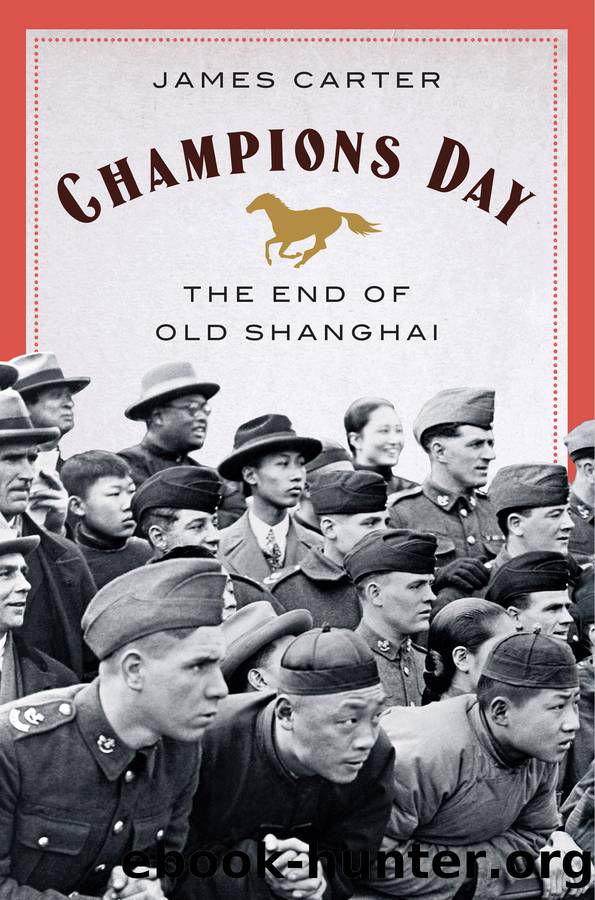Champions Day by James Carter

Author:James Carter
Language: eng
Format: epub
Publisher: W. W. Norton & Company
Published: 2020-05-06T00:00:00+00:00
Original caption: “A good example of a China pony, brought over from the Mongolian steppes: Applejack, one of the spring winners.” Shanghai Race Club, 1939.
WHILE HENCHMAN WAITED FOR his next opportunity, news from Europe dominated the summer of 1939. Germany invaded Poland in September, and Shanghai could no longer dismiss the war as a dispute between China and Japan. The United States remained neutral, but Britain was now besieged and at war. France’s defeat by the Nazis meant that French overseas territories—including the French Concession in Shanghai—were now technically allies of the Germans and also the Japanese. Though no territory in Shanghai changed hands, and the French Concession continued to operate as it had before, many wondered whether the new war would affect Japan’s plans for China, and perhaps bring the Europeans or even the Americans into a Pacific theater. And then what for Shanghai?
Europe slipped over the precipice, but Henchman remained focused on the races. After Hindhead’s near miss in the spring, he entered the fall race meeting as a strong favorite, and most viewed his qualifying race, the Griffins Stakes, as a formality. The crowd thought him in perfect position as he broke from the gate in second place, but the race did not play out according to Henchman’s script. Hindhead stayed second the whole way around the track, falling farther and farther behind and finishing six lengths back of the winner, Don Enrico. To the dismay of his owner and many supporters, Hindhead was shut out of the winner’s circle altogether at the fall race meeting, failing even to qualify for Champions Day. When the main event came, Henchman’s second-string, Bagshot, managed second place, but this year it was Gussie White’s White Parade winning the Champions’ Cup after placing three straight times. Hench would have to wait, again.
The German invasion seemed to confirm Victor Sassoon’s sense that a wider war was inevitable, but not everyone shared this concern (or at least his response). Eric Moller also anticipated the expansion of Japanese influence and power in Shanghai, but rather than avoid it, he embraced it. In 1939 he made a gift of $5,000 to the Japanese Soldiers and Sailors Hospital fund, “in appreciation of the valour of army and navy officers and men.”10 Shanghailanders were accustomed to straddling all sorts of ethical fences—not least by racing ponies while Chinese refugees and news of atrocities streamed into Shanghai—but Moller’s gesture was more overt than most. It was not the first time that Moller’s actions elicited controversy, profitable though they were. In the 1920s, at least two Moller ships had been found to be transporting opium, illegally, among Taiwan, Japan, and the Russian Far East, their cargo falsely reported as fish.11
The 1940s began with the International Settlement still clinging to hope that its impossible situation might yet be sustainable. When bombs had exploded in the Settlement on Bloody Saturday, few expected the Lone Island to last the year, let alone the decade. Yet the Japanese lines around the Settlement had stabilized; the longer they stayed in place, the more permanent they seemed.
Download
This site does not store any files on its server. We only index and link to content provided by other sites. Please contact the content providers to delete copyright contents if any and email us, we'll remove relevant links or contents immediately.
Twisted Games: A Forbidden Royal Bodyguard Romance by Ana Huang(3985)
Den of Vipers by K.A Knight(2688)
The Push by Ashley Audrain(2682)
Win by Harlan Coben(2654)
Echo by Seven Rue(2237)
Beautiful World, Where Are You: A Novel by Sally Rooney(2153)
Baby Bird by Seven Rue(2114)
Iron Widow by Xiran Jay Zhao(2109)
A Little Life: A Novel by Hanya Yanagihara(2106)
Leave the World Behind by Rumaan Alam(2093)
Midnight Mass by Sierra Simone(1998)
Undercover Threat by Sharon Dunn(1779)
Bridgertons 2.5: The Viscount Who Loved Me [Epilogue] by Julia Quinn(1774)
The Four Winds by Hannah Kristin(1764)
Sister Fidelma 07 - The Monk Who Vanished by Peter Tremayne(1649)
The Warrior's Princess Prize by Carol Townend(1621)
Snowflakes by Ruth Ware(1588)
Dark Deception by Rina Kent(1557)
Facing the Mountain by Daniel James Brown(1544)
